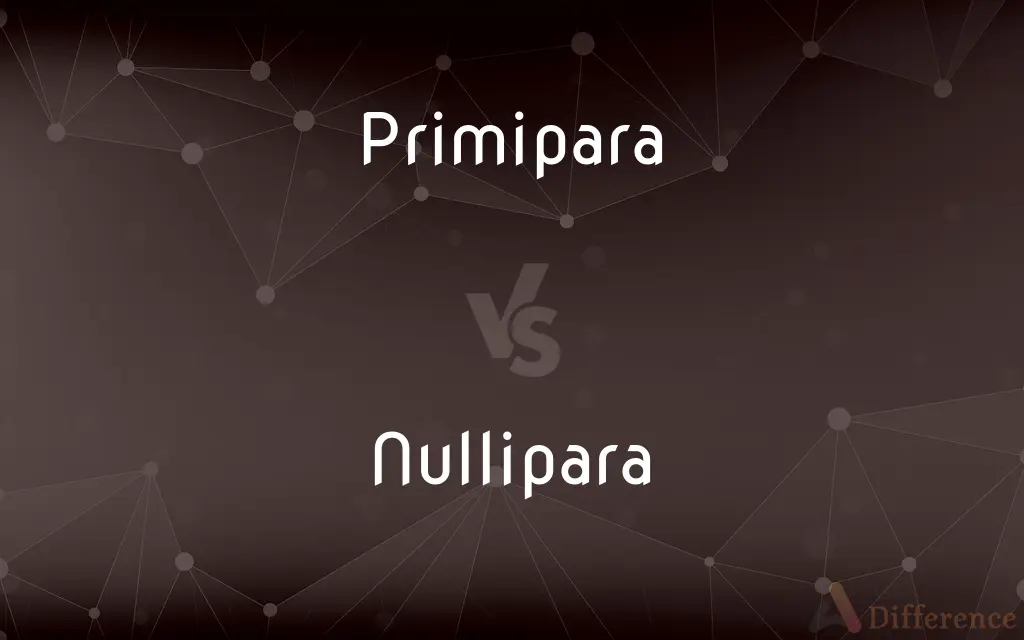Primipara vs. Nullipara — What's the Difference?
By Fiza Rafique & Urooj Arif — Updated on March 25, 2024
Primipara refers to a woman who has given birth once, while nullipara describes a woman who has never given birth.

Difference Between Primipara and Nullipara
Table of Contents
ADVERTISEMENT
Key Differences
Primipara is a term used in obstetrics to describe a woman who has given birth to a viable offspring once. This classification is part of the obstetric history that helps healthcare providers understand a woman's pregnancy and childbirth history, which can be crucial for managing current or future pregnancies. On the other hand, nullipara refers to a woman who has never given birth to a viable offspring, regardless of whether she has been pregnant before. This distinction is significant because it impacts the medical care and monitoring required during pregnancy and childbirth.
The obstetric history of a woman, including whether she is primipara or nullipara, plays a critical role in her healthcare. For primiparas, the experience of having gone through pregnancy and childbirth once can influence both the physical and psychological aspects of subsequent pregnancies. Whereas nulliparas, having never experienced childbirth, may have different needs and concerns that healthcare providers need to address, including education about pregnancy, childbirth, and what to expect.
In terms of risk assessment, primiparas and nulliparas may face different risks and complications. Primiparas have a known obstetric history that can provide insights into potential risks in future pregnancies, such as predispositions to certain conditions. Nulliparas, without a childbirth history, might present a different set of risks and unknowns that require careful monitoring and management by healthcare professionals.
It's also important to note that the terms primipara and nullipara are part of a larger system of terminology used to describe a woman's reproductive history, including terms like multipara (a woman who has given birth more than once) and grand multipara (a woman who has given birth five or more times). This system helps in quickly conveying important reproductive history to healthcare providers.
The transition from nullipara to primipara marks a significant change in a woman's life, impacting her physically, emotionally, and socially. This transition is recognized and managed differently across cultures and healthcare systems, reflecting the diverse experiences of motherhood.
ADVERTISEMENT
Comparison Chart
Definition
A woman who has given birth once.
A woman who has never given birth.
Obstetric History
Includes the experience of one pregnancy and childbirth.
Lacks childbirth experience, regardless of pregnancy history.
Healthcare Needs
May focus on issues identified in previous pregnancies.
Emphasizes education and monitoring for first-time pregnancy.
Risk Assessment
Based on previous childbirth experience and outcomes.
Focuses on baseline health and potential pregnancy risks.
Significance
Indicates a certain level of reproductive experience.
Indicates no prior experience with childbirth.
Compare with Definitions
Primipara
A woman who has given birth to a viable offspring once.
A primipara may have different healthcare needs based on her first childbirth experience.
Nullipara
Includes pregnancies but no childbirth, affecting risk assessments.
Even as a nullipara, her previous pregnancies may influence her care plan.
Primipara
Helps in understanding potential risks for current or future pregnancies.
Her status as a primipara suggests she previously had a cesarean section, important for planning future deliveries.
Nullipara
May experience significant anticipation and anxiety about childbirth.
Societal expectations and personal uncertainties can significantly affect a nullipara's pregnancy experience.
Primipara
Focused on leveraging previous childbirth experiences.
As a primipara, she was more aware of the signs of labor and when to seek medical attention.
Nullipara
A woman who has never given birth to a viable offspring.
A nullipara may require more comprehensive prenatal education and support.
Primipara
Transition to motherhood changes her social and healthcare interactions.
Becoming a primipara has increased her engagement with pediatric healthcare services.
Nullipara
Emphasis on preparing for the unknown aspects of childbirth.
Healthcare providers may offer specialized classes for nulliparas to prepare for childbirth.
Primipara
Specific previous pregnancy outcomes can inform care.
Given her uncomplicated delivery as a primipara, she may have a lower risk of complications in her next pregnancy.
Nullipara
Careful monitoring for first-time pregnancy complications.
As a nullipara, she may undergo more frequent monitoring to identify any potential risks early.
Primipara
See primigravida.
Nullipara
A woman who has never given birth.
Primipara
A woman who has given birth to only one child.
Nullipara
A woman who has never carried a pregnancy beyond 20 weeks (one who has never given birth). It includes women who have experienced spontaneous miscarriages and induced abortions before the mid-point of pregnancy, but not women who have experienced pregnancy loss after 20 weeks.
Primipara
A woman or female animal during or after her first pregnancy.
Nullipara
(obstetrics) a woman who has never give birth to a child
Primipara
A woman or female animal that has carried a first pregnancy to a viable gestational age.
Primipara
A woman who bears a child for the first time.
Primipara
(obstetrics) woman who has been delivered of a child for the first time
Common Curiosities
What does primipara mean?
Primipara refers to a woman who has given birth to a viable offspring once.
Why is obstetric history important?
Obstetric history provides critical insights into potential risks and the best care practices for current or future pregnancies.
How do healthcare needs differ between primiparas and nulliparas?
Primiparas may need care that considers past childbirth experiences, while nulliparas may require more education and monitoring for a first-time pregnancy.
What transitions a woman from nullipara to primipara?
Giving birth to a viable offspring transitions a woman from nullipara to primipara.
Are there specific concerns for primiparas in subsequent pregnancies?
Yes, any complications or specific conditions from the first childbirth will be considered in managing subsequent pregnancies.
Does being a nullipara affect pregnancy risk?
Being a nullipara may affect pregnancy risk assessments, as there is no prior childbirth experience to inform potential complications.
Can a woman's nullipara status change if she has been pregnant but never given birth?
Yes, a woman remains a nullipara until she gives birth to a viable offspring, regardless of pregnancy history.
Can a woman be both a primipara and nullipara?
No, these terms are mutually exclusive; a woman is considered a primipara once she has given birth once, and before that, she is a nullipara.
Who is considered a nullipara?
A nullipara is a woman who has never given birth to a viable offspring.
How does previous childbirth experience influence future pregnancies?
Previous childbirth experiences can inform healthcare providers about potential risks and inform care plans for future pregnancies.
What are the implications of being a primipara for maternal health?
Being a primipara can influence maternal health considerations, including physical recovery from the first birth and psychological adjustments.
How is the term primipara used in healthcare?
It is used to quickly convey a woman’s reproductive history, particularly her experience with childbirth, to healthcare providers.
What support might nulliparas need during pregnancy?
Nulliparas may need more comprehensive prenatal education, emotional support, and monitoring to prepare for childbirth.
Share Your Discovery

Previous Comparison
Megaphone vs. Loudhailer
Next Comparison
Miscategorized vs. MiscategorisedAuthor Spotlight
Written by
Fiza RafiqueFiza Rafique is a skilled content writer at AskDifference.com, where she meticulously refines and enhances written pieces. Drawing from her vast editorial expertise, Fiza ensures clarity, accuracy, and precision in every article. Passionate about language, she continually seeks to elevate the quality of content for readers worldwide.
Co-written by
Urooj ArifUrooj is a skilled content writer at Ask Difference, known for her exceptional ability to simplify complex topics into engaging and informative content. With a passion for research and a flair for clear, concise writing, she consistently delivers articles that resonate with our diverse audience.
















































